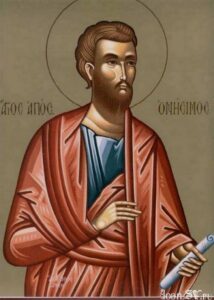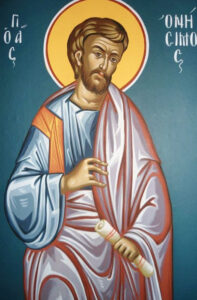St Onesimus – Feb. 15

St Onesimus, a fugitive slave of St. Philemon, was a Phrygian by birth. Apostle St. Paul mentions him, as a dear brother and son, while in chains, in his prison epistle to St. Philemon. He was a Christian of distinguished lineage, living in the city of Colossae, Phrygia. The fugitive sinner slave, finds grace, forgiveness, and the freedom that is found only in Jesus Christ. Onesimus was referred to as “the faithful and beloved brother, who is one of yourselves” (Col 4: 9). These words, and the reference to Archippus (Col 4: 17) connect Philemon and Colossians, and also provide evidence that Onesimus was a man of Colossae.
Onesimus had robbed his master Philemon and to escape the punishment of theft, he fled to Rome a large city where he could easily hide. There Onesimus encountered Paul, where the apostle was serving time in prison, in Rome. As a slave, he ran from his master, Philemon but came face to face with the living God through His servant Paul. He heard the Gospel of Christ from St Paul and was converted to Christianity. In prison after his encounter with Apostle Paul, Onesimus was enlightened and was baptized. In prison Saint Onesimus served the Apostle Paul like a son, “that I appeal to you for my son Onesimus, who became my son while I was in chains”. (Phil. 10). He is described as “a runaway slave, whom the apostle Paul received to the faith of Christ while in prison, regarding him as a Spiritual son of whom he had become spiritual father, as he himself wrote to Philemon, Onesimus’ master”. Here is a classic picture of one who tries to run from God, a good and gracious Master, but instead runs right into His arms.

‘Onesimus’ appears in two New Testament epistles, in Colossians 4 and in Philemon. Philemon lived in Colossae with his family, and the Colossian Church met at his house. St. Paul wrote his letter to the Colossians at the same time he wrote to Philemon. In Colossians 4: 9, Onesimus is identified as a Christian accompanying Tychicus to visit the Christians in Colossae. There is no other description stated about him in this context. In the Epistle to Philemon, he may well be the freed Onesimus. In that letter, Paul mentioned that Onesimus would be coming home. Paul gave both letters to Tychicus and Onesimus to carry back to Philemon. “He is coming with Onesimus, our faithful and dear brother, who is one of you. They will tell you everything that is happening here” (Colossians 4: 9).
St. Paul refers to Onesimus in verse Phil. 11: “Formerly he was useless to you, but now he has become useful both to you and to me.” Onesimus means ‘beneficial, helpful, useful, or profitable’, a common name among slaves at that time. Onesimus had been useless or unprofitable to Philemon, but now he had become immensely beneficial to both his master and to Paul. As a believer in Jesus Christ, Onesimus lived up to his name. St. Paul pleaded with Onesimus’ master, Philemon to accept Onesimus back, not as a slave but as a believer and a brother in Christ. St Paul cared deeply for Onesimus because the young man had been a great blessing to him. In fact, Onesimus had been so helpful that Paul longed for him to stay at his side: “I am sending him—who is my very heart—back to you. I would have liked to keep him with me so that he could take your place in helping me while I am in chains for the gospel. But I did not want to do anything without your consent, so that any favor you do would not seem forced but would be voluntary” (Philemon 1: 12–14).

St Paul calls him “my child” perhaps revealing that Paul was his spiritual father, leading him to saving faith in Christ since he was no longer a bondservant but a brother in Christ (1: 16). Paul sent him back (1:12) because it was the right thing to do as Paul didn’t want to do anything without Philemon’s consent (1:14).
The heart of St Paul’s plea, to the forgiving spirit of St. Philemon is summed up in verses 15–19: “Perhaps the reason [Onesimus] was separated from you for a little while was that you might have him back forever — no longer as a slave, but better than a slave, as a dear brother. He is very dear to me but even dearer to you, both as a fellow man and as a brother in the Lord. So, if you consider me a partner, welcome him as you would welcome me. If he has done you any wrong or owes you anything, charge it to me. I, Paul, am writing this with my own hand. I will pay it back—not to mention that you owe me your very self” (Phil. 1: 15–19).

After he received the letter, Saint Philemon, a kind and gracious Christian master, not only forgave Onesimus, but also sent him back to Rome to the apostle. St. Ignatius of Antioch mentions by name Onesimus, as bishop in Ephesus, which would put Onesimus as old as 95, while he passed away. Onesimus was consecrated a bishop by the Apostles and accepted the episcopal throne in Ephesus, after Timothy. Thus, Onesimus rose from a slave to a brother to a bishop. He served the Church for many years before dying a martyr. St. Onesimus was arrested and brought to trial before the Eparch Tertillus, during the reign of the Emperor Domitian (81 AD to 96 AD) and persecution of Trajan, around AD 109. He held Onesimus in prison for eighteen days, and transferred him to prison in Puteoli. Later, the eparch sent for St Onesimus, had him stoned, beaten with clubs and beheaded for still maintaining his faith in Christ. A certain illustrious woman took the body of the martyr and placed it in a silver coffin. Thus Onesimus, begotten by the faith of Paul was adopted by God through grace, became a martyr of God.
St Onesimus is also commemorated on February 15 and November 22, with Sts Philemon, Archippus and Aphia. “May the favor of the Lord our God rest on us; establish the work of our hands for us. Yes, establish the work of our hands” (Psalm 90).

0 Comments